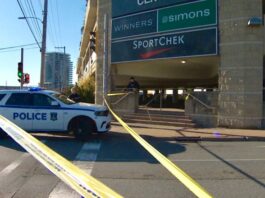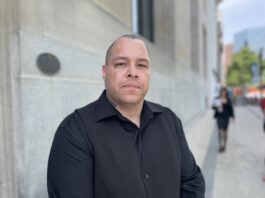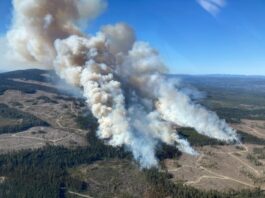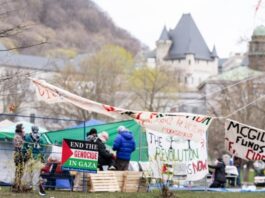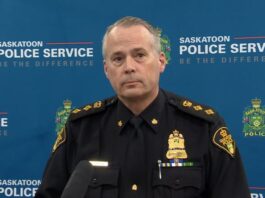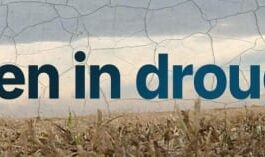
Though no link has been made between the effective closure of Roxham Road and the deaths of two Romanian and Indian families on the St. Lawrence River in Akwesasne last week, advocates for migrants say they expect more tragedies of the kind as increased border surveillance resulting from the closure pushes people to take greater risks.
The renegotiation of the Safe Third Country Agreement (STCA) announced March 24 led to the detention of dozens of asylum seekers at the Canada-U.S. border south of Montreal for days before being sent back into rural New York with no plan, their savings spent and almost no resources to help them find food, shelter and rides.
That weekend, residents of nearby Hemmingford, Que., witnessed a family being arrested by RCMP in their driveway after the two adults and two small children had tried illegally crossing into Canada.
Just under a week later, on Thursday, Akwesasne first responders found the bodies of six of the eight Indian and Romanian people who authorities believe had attempted to cross into the U.S. the previous night. Two other bodies were discovered the next day.
Police continue to search for a 30-year-old local man, Casey Oakes. He was last seen last Wednesday launching into the St. Lawrence in a light blue boat. A boat matching that description was also found capsized in a marshy area where searchers pulled the bodies from the water.
On Tuesday, police said in a news release they believe Oakes was connected to the deaths, after previously declining to make that connection.
“This is just one of many that will unfold, as tragedies,” said Reena Kukreja, an assistant professor at Queen’s University, who studies border policies and South Asian migration.
“Roxham closing, I’m thinking, is going to lead to more crossings through the river pathway and during the night, when it’s stormy, when the weather isn’t safe and you do not expect patrols to be out.”
There were fierce winds and sleet falling Wednesday evening, when Oakes was last seen on Cornwall Island.

Akwesasne Mohawk police identified two of the Romanian family members on Saturday as Cristina (Monalisa) Zenaida Iordache and Florin Iordache, who were both 28. The man was carrying Canadian passports for the couple’s two young children — aged one and two — who were among the victims.
The family of Indian nationals has been identified by Indian police in the state of Gujarat as Praveenbhai Chaudhari, 50, who was the father; mother, Dakshaben, 45; son, Meet, 20; and 23-year-old daughter, Vidhi.
Since Akwesasne police were given $6.5 million in funding by the Quebec government last year to help with patrolling the waters, Police Chief Shawn Dulude said officers have increased their patrols from being sporadic to “pretty much on a daily basis.” In a news conference last Friday, Dulude said the service had planned to soon expand those patrols to being “24/7.”
When a reporter asked whether it was possible the families had chosen to cross the river at night to avoid being caught, Dulude said “asking the question is almost answering it.” He added that several factors could have caused the boat to go off course and capsize.
Immigration, Refugees and Citizenship Canada issued a statement Tuesday, saying the changes to the STCA are intended to deter people from using Canada’s land border as a way of claiming asylum.
“We are incredibly saddened by the recent deaths near Cornwall Island. Our condolences go out to the families of the deceased,” IRCC spokesperson Stuart Isherwood wrote in an email.
“Irregular routes to Canada or to other countries present very real dangers. We encourage individuals in need of protection to claim asylum in the first safe country that they enter and to do so at a designated port of entry.”
Romanian family faced deportation
Public federal documents show Florin Iordache, the Romanian father who died on the river, had applied for a pre-removal risk assessment. That assessment is typically the last ditch effort available in Canadian immigration law to prevent or delay someone’s removal from the country. His request was denied.
Documents show Iordache was seeking a judicial review of the refusal. A friend told The Canadian Press Monday the family had been facing deportation when they decided to join family members in Florida by attempting to cross into the U.S. through Akwesasne.
“These two kids were born in Canada and somehow we failed these two families,” said Ralph Shayne, a member of an umbrella organization for 163 groups helping refugees called La Table de concertation des organismes au service des personnes réfugiées et immigrantes (TCRI).
“He preferred to risk his life than to be deported back to his country of citizenship,” Shayne added, referring to Florin Iordache.

At Roxham, asylum claimants were vetted for security risks and their identities were recorded by RCMP and border services, Shayne noted.
“What makes more sense: for them to cross at Roxham Road where we know the identity of each and every person crossing? Or, to let them cross over 9,000 kilometres of border and we just don’t know who’s coming in?” he said.
A number of groups for refugees held a protest outside Prime Minister Justin Trudeau’s Montreal riding office Tuesday afternoon, denouncing the recent Safe Third Country Agreement changes and a lack of support for asylum seekers already in the country. A similar protest was also held in Toronto.
April 4 is Refugee Rights Day in Canada, commemorating a 1985 Supreme Court decision that the Canadian Charter of Rights and Freedoms applies to refugees.
Wendy Ayotte, a founding member of Bridges Not Borders, a group of volunteers who would hand asylum seekers warm clothes at Roxham Road and work to provide migrants with clear information about the asylum process in Canada, says it’s not realistic for Canada to turn away asylum seekers at the border.

Ayotte called the extension of the STCA across the entire border “a clear indication that we do not want those people who are coming here through Roxham Road, that we are not willing to take those people in, who are seeking protection.”
Trudeau said on Radio-Canada’s Tout le monde en parle TV program that Canada wanted to instead encourage asylum seekers to take more regular paths to migration.
Several advocates have said that while Canada has granted visas to 190,000 Ukrainians in just over a year, it has meanwhile sent a message that the 40,000 asylum seekers who’ve crossed at Roxham in the past year are not welcome.
“It’s unequal treatment. It’s prejudicial treatment,” Ayotte said, adding the “radical change of policy … has made Canada a much less welcoming place to refugees, without a doubt.”







